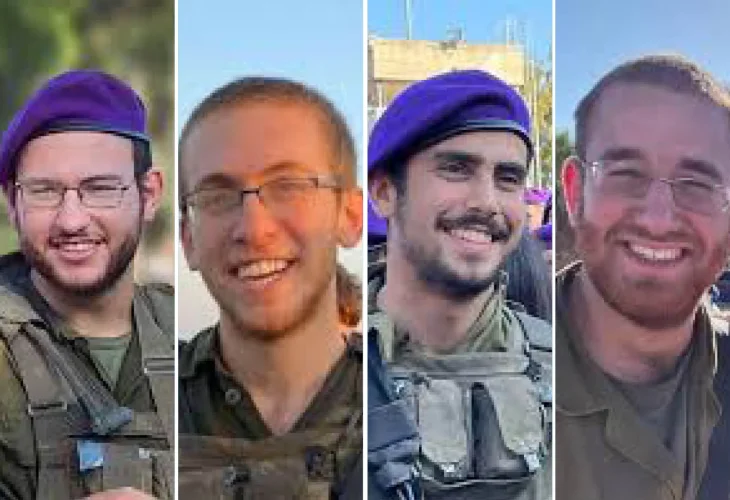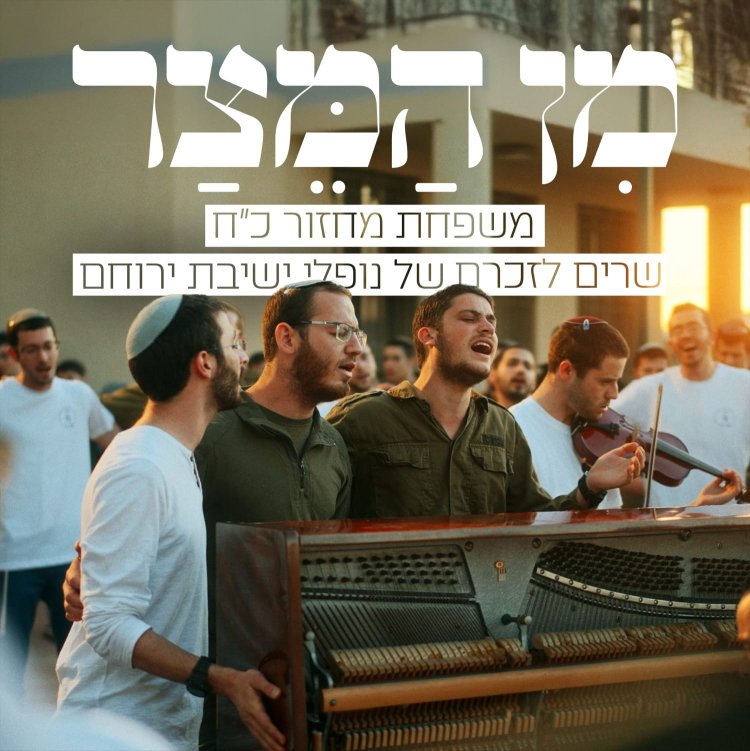A Melody in Memory: A Song Born in Gaza
Matanel Lisner and Efraim Yechman composed a heartfelt melody during a tense Shabbat in Gaza. They couldn't have imagined the song would later honor the memories of Efraim and three other comrades.
 Yakir Shankolevsky, Efraim Yechman, Yair Hanania, and Eitan Rosenzweig z"l
Yakir Shankolevsky, Efraim Yechman, Yair Hanania, and Eitan Rosenzweig z"lOnly a few weeks after the start of the Iron Swords War, ground forces began entering Gaza. Among the first were troops from Unit 401, including a group from the Yeshivat Hesder in Yeruham. Though they had finished their military service, the war summoned them back into action. No one could have predicted that ten of these yeshiva students would give their lives for Israel, four of them from the same class.
"Space inside the armored vehicle was limited," recalls Matanel Lisner, now a yeshiva student himself. "At first, Efraim Yechman and I were told we couldn't join, which deeply disappointed us. We tried every connection we had until, in the last moment, one of the commanders called to say: 'There's space; we need you!' It was fantastic news, and I immediately informed Efraim, who was thrilled. We'd worked and waited for this moment."
A Melody is Born
Lisner will never forget their first Shabbat in Gaza. "It was the 13th of Cheshvan, 5784," he notes. "Even now, I vividly recall the feeling—rockets fell to our right and left, and as we gathered within ourselves during the third meal—the 'raava deravin' hour—the reality struck us. We were engaged in tight battle, right amidst life-threatening danger.
"We sang 'Even as I walk through the valley of the shadow of death,' among other moving songs of the soul. Then I told Efraim about a verse that captured our feelings: 'From the straits, I called to Hashem; Hashem answered me with expansiveness.' We discussed how there were other tunes for these words, yet all were upbeat. I proposed to Efraim: 'Let's compose something more solemn, fitting for our current mood.' A gifted musician, Efraim could play many instruments, and he loved the idea. We created the tune from our heartfelt cries. Unable to record on Shabbat, Efraim suggested, 'We'll sing it a hundred times until it's stuck in our minds,' and that's precisely what we did.
"In combat, we held onto the tune, always seeking the chance to teach it to our comrades. A mere two and a half weeks later, our friend, a classmate—Eitan Rosenzweig, z"l—was killed. It was devastating. To support one another, we gathered in the armored vehicle and taught them the tune, explaining the profound meaning of the lyrics: King David calls out to Hashem, saying, 'I am merely human, limited in my understanding amidst crisis; but I turn to You, the eternal Creator, who knows all. Brighten my eyes to understand where You stand in this wider picture.' Through exploring these words, we strengthened our faith.
"As we continued to fight, another few weeks later, our friend Yakir Shankolevsky of the armor unit fell. I spoke with Efraim then about releasing the song to honor our two dear friends after the war. We never foresaw the chilling events yet to unfold.
"Weeks later, we were in Darja Tfuah, northern Gaza, for a company briefing in a building when suddenly three terrorists broke in from the roof, shooting wildly. Quickly, we realized we had casualties and needed to act fast. Our commander divided us as some charged the terrorists and others of us evacuated the injured and dead. Efraim was among the first to charge, being the machine-gunner, while I assisted the evacuees. Just after we cleared the stairs, a grenade exploded mere meters behind us. I shouted 'Grenade!' and moments later felt a powerful blast, realizing I was hit. Completing the evacuation of the injured, I evacuated myself. Only afterward did I learn that Efraim was critically injured by terrorist fire and was airlifted to Soroka Hospital. The following morning, my parents woke me with the tragic news of Efraim's passing."
Lisner pauses, struggling with emotion. "I was Efraim's closest partner for over two months; we never left each other's side," he says quietly. "In fact, I was with him right until his last moments. I even have a recording from the encounter, capturing Efraim's directions during first aid for the injured: 'Come on, guys, help get the clothes off!' He remained vital until the very end, which embodied his life's mission. Constantly seeking ways to contribute modestly and humbly, never complaining, even as a machine-gunner carrying extremely heavy loads, he was always first for every task.
"Personally, I experienced countless meaningful moments with Efraim during the war—hours of shared conversations and studies. We decided early on that no matter what happened around us, we would maintain our studies, Shabbat atmosphere, and mitzvah adherence as much as possible, helping us preserve and even elevate our spiritual stature."

Continuing to Grow
How does one move forward after such profound loss and tragedy?
"First of all, attending Efraim's shiva was crucial for me, and the hospital's staff allowed me a few hours to attend. During the shiva, a bond formed between me and Yosef, Efraim's brother. We agreed that after the war, we would release the song. Of course, we could not have anticipated how long the war would drag on.
"In the meantime, we reached out to Yair Hanania, our classmate still in service after our discharge, asking him to record a demo in his home studio. He obliged, sending us a recording, but months later, we received another terrible blow—Hanania fell in battle in Jebalia. At that moment, we understood the song needed to be released, incorporating Hanania's voice as part of its soundtrack. This realization led us to approach the task with renewed purpose, recording the song in a professional studio. Post-recording, we decided to create a video accompaniment for the song, deliberating extensively on its content."
What were the deliberations about?
"While the song obviously tributes our four fallen friends, we wanted it to offer more than that. We aimed for the song to also express messages of growth and continuity, understanding that pain isn't meant to crush, but to propel us forward. That's why the video captures the three worlds central to our friends in their final years—family, the military, and Torah study. Through each world, we tried to convey a profound perspective on life, with the core message of partnership with the Jewish people in Torah study, defense, and fighting for the land, all rooted in home education and Yeshivat Yeruham.
"For the video, we printed shirts for our class marked with 'Batch Family,' signifying our familial bond, adding four leaves—one for each friend lost. The deep roots depicted represent the stability and depth our connection to these worlds provides, informing our battle engagement from these realms and our capacity to navigate the aftermath's pain and difficulty, driving us toward growth and action."
On the topic of family, Lisner notes they maintain a very close connection with the families of the fallen, who have become integral to their lives, appearing in the video and participating in their joyous occasions. "I recently got married," he mentions, "and Efraim Yechman's father was honored at the wedding, with the engagement blessings said over a cup in memory of Eitan Rosenzweig, z"l. Naturally, Yair Hanania's and Yakir Shankolevsky's families were also invited. These are extraordinary families from whom we draw boundless strength."
Lisner concludes, "One sentiment that greatly encouraged me during the song and video production was an explanation I heard from Yosef, Efraim's brother, at the funeral. Yosef asked, 'What is a funeral?' and noted many believe it's about accompanying a deceased to their final rest. But the word also derives from 'to borrow,' meaning those attending hear stories about the deceased that inspire them to say, 'This life force that dwelled within him, I wish to adopt for my journey.' That captures what we tried to convey in the video—memories of those closest to us, guiding us to aspire to emulate them, drawing strength to continue growth and endeavors with Hashem's help."

